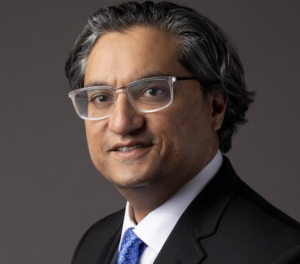 Amit Khanna, MD, is the Regional Director of Colon & Rectal Surgery, Bridgeport Hospital
Amit Khanna, MD, is the Regional Director of Colon & Rectal Surgery, Bridgeport Hospital
Dr. Khanna is a New York City native and completed his undergraduate education at Johns Hopkins University. Returning to New York, he completed his medical degree from Mount Sinai/ NYU School of Medicine and completed a master’s in public health with a concentration in Health Policy and Management from Columbia University. He completed general surgery training at the University of Rochester followed by a fellowship in colon and rectal surgery at The Cleveland Clinic Florida.
His special interest areas are in complex colorectal disease, colorectal malignancy, anorectal disease, and minimally invasive robotic surgery. Dr. Khanna has been named five times as a Castle Connolly Regional Top Doctor, Philadelphia Magazine Top Doctor-in Colon and Rectal Surgery, and Top Doctor for Cancer. He has served as an appointed member of national committees of the American Society of Colon and Rectal Surgeons in video-based education, health economics, new technology and website development. Dr. Khanna currently holds the position of Assistant Professor of Surgery, Yale School of Medicine, Regional Director of Colon and Rectal Surgery and Director of Colon and Rectal Surgery, Bridgeport Hospital.
Summary
Dr. Amit Khanna, an accomplished colorectal surgeon, gave an informative talk about colorectal health, focusing on colorectal cancer prevention, screening, and treatment
His presentation emphasized the seriousness of colorectal cancer, noting it as the second leading cause of cancer-related deaths worldwide. Despite improvements in colorectal cancer rates in patients over 50, the incidence is rising alarmingly in people under 50. Dr. Khanna stressed the importance of screening, particularly since colorectal cancer often starts as benign polyps that can turn malignant over time.
He discussed various screening methods, from the gold standard of colonoscopy to stool-based DNA tests like Cologuard. While non-invasive tests offer convenience, Dr. Khanna noted that they can sometimes produce false positives or negatives, which might lead to unnecessary procedures or missed diagnoses. He mentioned recent developments, such as a newly FDA-approved blood test for average-risk patients, which could change future screening practices.
Dr. Khanna also highlighted the influence of lifestyle choices on colorectal health, explaining that smoking, excessive alcohol consumption, high red meat intake, and a sedentary lifestyle can significantly increase the risk of colorectal cancer. He encouraged increasing fiber intake, regular exercise, and a balanced diet rich in vegetables and whole grains.
Furthermore, he discussed emerging research on the microbiome’s role in colorectal cancer, noting ongoing studies at Yale examining the relationship between gut bacteria and cancer development. Dr. Khanna acknowledged that probiotics and dietary choices could impact the microbiome, but more research is needed to fully understand their preventive potential.
He also addressed the challenges survivors of colorectal cancer face, particularly in managing long-term effects from treatments like chemotherapy and radiation. The talk concluded with a strong message about the importance of primary care and team-based approaches to healthcare. Dr. Khanna emphasized that prevention, early detection, and ongoing support are key to reducing the burden of colorectal cancer
